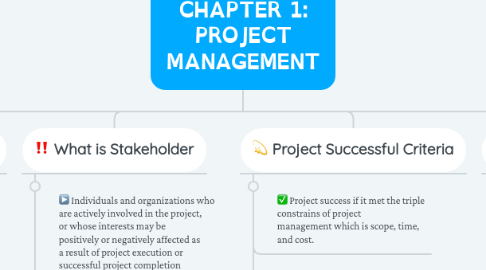
1. What is Project Management
1.1. The application of knowledge, skills, tools, and techniques to project activities to meet project requirements
2. The Benefits of Formal Project Management
2.1. Defining everyone’s role eliminates confusion, keep everyone knows who the project lead is as well as the responsibilities of other involved
2.2. Clear, organized plan improve team collaboration, keeps everything that needs to get done, along with task owners, deliverables and due dates
3. Roles of Project Manager
3.1. Cost Estimating and Developing The Budged
3.1.1. Good project managers know how to keep a project within its set budget. Even if a project meets a client’s expectations and is delivered on time. Good project managers frequently review the budget and plan ahead to avoid massive budget overruns
3.2. Activities and Resource Planning
3.2.1. Good project managers define the project’s scope and determine available resources. Project managers create a clear and concise plan both execute the project and monitor its progress.
3.3. Organizing and motivating a project team
3.3.1. Project managers put their teams front and center. They develop clear, straightforward plan that stimulate their teams to reach their full potential
3.4. Controlling Time Management
3.4.1. Good project managers know how to set realistic deadlines, and how to communicate them consistently to their teams.
4. What is Stakeholder
4.1. Individuals and organizations who are actively involved in the project, or whose interests may be positively or negatively affected as a result of project execution or successful project completion
4.1.1. For example, project managers, Team members, Managers, Resource managers, executives, company owners
5. The Triple Constrains
5.1. SCOPE
5.1.1. The manuscript in document of scope project is write about every detail of project development process from the beginning until the of the project.
5.2. COST
5.2.1. Cost and budged is another important thing because of every task and activity that related to the project is require the resource and when the require of resource is high, the cost will also high.
5.3. TIME
5.3.1. Important to schedule the time to manage the process that allocated in project planning phases and every task that involve in the project.
6. Project Successful Criteria
6.1. Project success if it met the triple constrains of project management which is scope, time, and cost.
6.2. Project success if it satisfied by the customer and sponsor
6.3. Project success if the result of the project achieves the main objective such as making the saving of certain amount of money, provide good return or make the sponsor satisfied.
7. Project Phases and Project Life Cycles
7.1. Project Phases
7.1.1. Early Phases
7.1.1.1. The resource requires to execute the project is the least because in the early phases, level of uncertainty or more know as “risk” is high. Meanwhile the project stakeholders have the best opportunity to influence the project
7.1.2. Middle Phases
7.1.2.1. The project is being confirm to execute and completing the project but more resource is needed to make sure the project is well as in the progress.
7.1.3. Final Phases
7.1.3.1. The project requirement was being met and also the sponsor approves the completion of the project.
7.2. Project Life Cycles
7.2.1. Project life cycles is the collection of “Project Phases” that defines what work will be performed in each phase, what deliverables will be produces and when it will make start, who involve in each phase and last but not least how the management will control and approve work produced in each phase.
8. Project Management Process Group
8.1. Initiating
8.1.1. Project starts the process and the value of project is determined as well as its feasibility and need to approve or reject the project by two documents are being sell to the stakeholder or sponsor
8.2. Planning
8.2.1. Resource, financing and material that are needed. In this phase, the project team need to start planning how to manage the project and direction of the project like scope, definition, task, schedule, cost, quality, organization, staff, communications, risk and procurement is clear
8.3. Executing
8.3.1. The project is follow the plan that have been created in planning phases also assign the task to team members and manage to monitor their progress
8.4. Controlling
8.4.1. All aspect of the project is being monitor to ensure that the project plan is being actualized and the processes that are needed to control this is reporting, scope, quality, schedule, cost, and risk
8.5. Closing
8.5.1. The project archives the goals and objective and the process for the closing the project is where scope of the project deliverable is completed as planned
